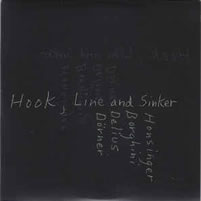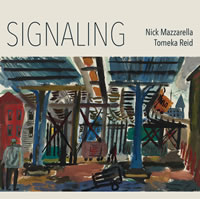Moment's Notice
Reviews of Recent Recordings
(continued)
Joel Futterman
Pathways
JDF 12
 The prolific pianist and saxophonist Joel Futterman has been recording solo piano albums since his 1979 debut, Cafeteria. Over decades as a committed improviser, and through long and consistent associations with Kidd Jordan, William Parker, and Alvin Fielder, among others, Futterman has crafted a very distinctive voice. On this bracing document, containing two lengthy explorations, he sounds as good as he ever has – both in terms of his own instrumental facility and in terms of recording clarity.
The prolific pianist and saxophonist Joel Futterman has been recording solo piano albums since his 1979 debut, Cafeteria. Over decades as a committed improviser, and through long and consistent associations with Kidd Jordan, William Parker, and Alvin Fielder, among others, Futterman has crafted a very distinctive voice. On this bracing document, containing two lengthy explorations, he sounds as good as he ever has – both in terms of his own instrumental facility and in terms of recording clarity.
For those not accustomed to Futterman, it’ll be tempting to lose oneself in the exuberant listening experience of getting caught up in the flow. And certainly there is a good deal of energy and momentum in the playing here. But it strikes me that the absolute key to Futterman’s imagination and expression is his affinity for contrast, albeit often explored at very high velocity. In the opening minutes of “Pathways, Part 1,” Futterman leans into some burbling, punchy low end, and elaborates phrase after staccato phrase. Sometimes restless, sometimes ruminative, the piece takes in different ideas about as fast as Futterman can entertain them. At any moment, he can rip off a multi-directional sprint, slashing through broken shards of chords, a blur of continual motion that recalls Borah Bergmann. Just as suddenly, things can drop off almost entirely, with single notes seeming to spelunk into the silence before ominous clouds well up.
Despite such examples, Futterman is less interested in the rise and fall dynamism of the typical session than with the crackling association of disparate ideas. But take note: there’s never merely whiplash effects for the sake of it; Futterman thinks quickly, but isn’t afraid to linger in a rich, resonant space. At times, an unanticipated pedal drone will emerge from passages of peak agonism. Elsewhere, he might explore some Bley-like balladry (and is that some “I Loves You, Porgy” I hear at the end of “Part 1”?). Brooding and pensive, jabbing lower-register workouts, and a sparse, brilliantine ending to “Part 2,” an ellipsis of glassy spiked chords. Yes, there’s an awful lot going on. But the more I inhabited this music, the more compelled I was by Futterman’s left hand, which sometimes almost sounds like abstracted boogie-woogie, and made for a fascinating through-line to these performances. Even if you’re fairly jaded by free jazz piano sessions at this point, this is compelling stuff, and it’s so gorgeously recorded.
–Jason Bivins
Tristan Honsinger + Hook, Line and Sinker
Hook, Line, and Sinker
De Platenbakkerij (PB007)
 Videotaped in a living space converted from a medieval dungeon, this continuous 40-minute improvisation by cellist Honsinger’s Hook, Line and Sinker quartet, evokes by turns comedy, terror, joy, banality, and madness. Just another night at home for these Amsterdam Dadaists.
Videotaped in a living space converted from a medieval dungeon, this continuous 40-minute improvisation by cellist Honsinger’s Hook, Line and Sinker quartet, evokes by turns comedy, terror, joy, banality, and madness. Just another night at home for these Amsterdam Dadaists.
The group, featuring tenor saxophonist Tobias Delius, trumpeter Axel Dörner, and bassist Antonio Borghini, creates a fluid collage in which abstract sounds, noise, scraps of folk tunes and jazz, intertwine and collide with silly theatrics, out of context horror movie scenarios, and just plain gibberish. Honsinger’s facial expressions and vocal imitations of an elderly woman are as much a part of the performance as the melancholy folk tunes or dry scrapings of his bow against strings. Dörner contributes flutters and moans, spitty air sounds, and lovely melody, then at one point he shuffles across with room with the bell of his trumpet pointed at the ceiling as he makes choo choo train sounds. Delius riffs and swings and vocalizes on tenor, but also collapses in terror as he screams at an unnamed horror. The theatrics, drawn from everyday banalities, have an uneasy, anxious comedy about them. Cliché, as Alfred Jarry reminded us, is the armature of the absolute. The music is virtuosic, of course, and the seemingly random flow of the piece has an underlying logic that is the product of close listening. The visual documentation is of a piece with the music. It feels very homemade, there’s only a single camera and the lighting is simple, but the bare bones production is also spot on, never missing a significant moment in the proceedings. The whole visual-musical package has all the forlorn dignity of a sculpture made of junk and discarded household items.
–Ed Hazell
Abdullah Ibrahim
Ancient Africa
Sackville SK 3049
 South African pianist Abdullah Ibrahim recorded two solo LPs worth of material for the Toronto-based Sackville label in 1973. Those albums, African Portraits, and Sangoma, have since been reissued on CD (with different song orders), as Fats, Duke & Monk, and Ancient Africa. The latter of the two is widely considered the stronger collection, containing the expansive three-part suites “Ancient Africa” and “The Aloe and The Wild Rose” from Sangoma, with the extended medley “Cherry/Bra Joe From Kilimanjaro” included from African Portraits. The most recent reissue also contains a previously unreleased bonus cut, “Khotso.”
South African pianist Abdullah Ibrahim recorded two solo LPs worth of material for the Toronto-based Sackville label in 1973. Those albums, African Portraits, and Sangoma, have since been reissued on CD (with different song orders), as Fats, Duke & Monk, and Ancient Africa. The latter of the two is widely considered the stronger collection, containing the expansive three-part suites “Ancient Africa” and “The Aloe and The Wild Rose” from Sangoma, with the extended medley “Cherry/Bra Joe From Kilimanjaro” included from African Portraits. The most recent reissue also contains a previously unreleased bonus cut, “Khotso.”
These lengthy solo piano pieces offer an impressive demonstration of Ibrahim’s improvisational prowess. The uplifting title track opens the set with raucous deportment; Ibrahim’s soulful vocalizations, ragged mantra-like refrains, and droning pedal points recall the traditional marabi style he helped pioneer and transform into Cape Jazz. A dramatic but stately ballad, “The Aloe and The Wild Rose,” is given a harmonically sophisticated reading, the sort one could imagine appealed to Duke Ellington, who helped Ibrahim gain global recognition in 1963 with Duke Ellington Presents the Dollar Brand Trio (Reprise) – five years before Brand converted to Islam and changed his name. The lyrical pairing “Cherry/Bra Joe From Kilimanjaro” concludes the original program with impassioned gospel motifs and a probing series of thematic variations buttressed by a spellbinding ostinato. Appended to the end, “Khotso” features Ibrahim reading poetry and playing bamboo flute. An interesting aside, it illustrates Ibrahim’s range, but pales in comparison to the spiritual power of his rapturous pianism.
Ibrahim generates a swirling undercurrent of hypnotic polyrhythms throughout the date, even without the aid of a bassist or drummer, enriching his tonal palette with dissonant counterpoint and polyphonic harmonies. A telling example of Ibrahim’s artistry, Ancient Africa is a most welcome reissue and recommended listening for those interested in the international reach of jazz following the post-war years.
–Troy Collins
Nick Mazzarella + Tomeka Reid
Signaling
Nessa 39
 Beginning early in the 21st century, Tomeka Reid gradually became well known as a cellist in many Chicago groupings. By contrast alto saxophonist Nick Mazzarella burst on the Chicago scene a decade ago, and his energy and lyricism made an immediate impact. Both heroes move freely amid the Chicago outside-jazz renaissance. This album is wholly improvised, which in principle is a musical conversation between equals. That’s Reid’s approach, whereas Mazzarella is aggressive in the Chicago way of early AACM artists, Hal Russell’s NRG Ensemble, and the rough tough adventurers they inspired to freely improvise.
Beginning early in the 21st century, Tomeka Reid gradually became well known as a cellist in many Chicago groupings. By contrast alto saxophonist Nick Mazzarella burst on the Chicago scene a decade ago, and his energy and lyricism made an immediate impact. Both heroes move freely amid the Chicago outside-jazz renaissance. This album is wholly improvised, which in principle is a musical conversation between equals. That’s Reid’s approach, whereas Mazzarella is aggressive in the Chicago way of early AACM artists, Hal Russell’s NRG Ensemble, and the rough tough adventurers they inspired to freely improvise.
So Reid usually lets Mazzarella take the lead in these nine pieces. They’re equals in the title piece, which starts with tones in space; gradually space is vanquished by phrases, she bows a lovely underline to his high crying tones, and the return of spaced sounds frames the work. It segues into “Like So Many Drops of Water,” in which Mazzarella’s solo, no doubt unconsciously, reflects the shape of one of the very greatest free solos, Roscoe Mitchell’s in “Number One” (in Lester Bowie, All the Numbers [Nessa]). “The Ancestors Speak” is an alto solo with long, slowly bending tones and a lovely slow, wide vibrato. Dialogue returns in “Topographies” as his fine solo line leads to her bowed assertions; her multiple-stopped solo casts a melancholy spell that he supplements with long, sometimes distorted tones. Mazzarella unleashes his energy in “Interstices” and the concluding “Invoking a Spirit” is perfect, a slow alto melody over a long, held chord.
The album starts with a tribute to Julius Hemphill and Abdul Wadud, Mazzarella’s and Reid’s alto-cello ancestors of cherished memory; but the tribute’s sax solo with walking cello accompaniment is an approach that permeates too much of the rest of the CD. She doesn’t confront him. In her other recordings, Reid is a valuable ensemble partner, joining Roscoe Mitchell’s energy or in empathy with Nicole Mitchell, Mike Reed, Mazz Swift, and others, including her Tomeka Reid Quartet (Thirsty Ear). Mazzarella, who began as an intense melodist kin to Hemphill and Ornette Coleman, has grown in intensity and become a more expressive artist, sometimes with coarse-toned cries – his trio’s Ultraviolet (International Anthem) is an especially powerful statement. He’s best with players who match his force. There’s a lot of pleasure in Signaling, yet Reid and Mazzarella are not quite a unit made in heaven.
–John Litweiler